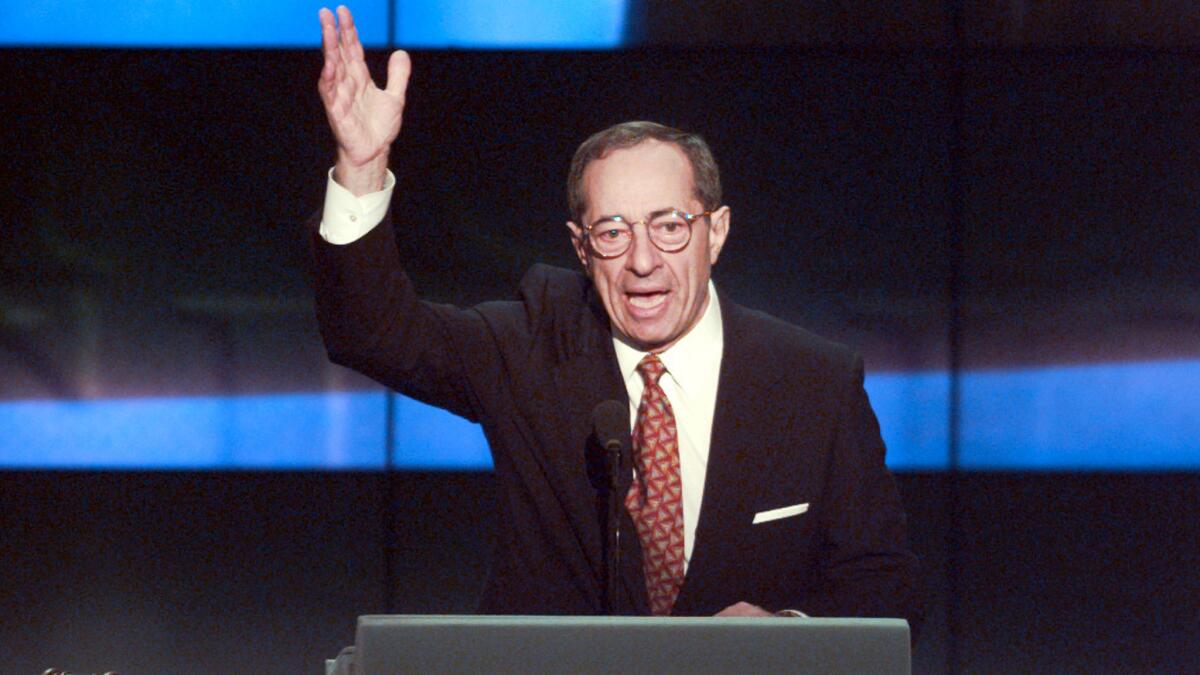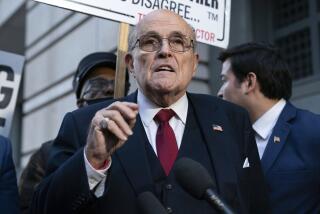Mario Cuomo, former New York governor and fiery liberal, dies at 82

- Share via
Mario Cuomo, the three-term governor of New York and liberal firebrand who soared onto the national stage with an eloquent attack on President Reagan at the 1984 Democratic National Convention, died Thursday at his home in New York City. He was 82.
His death was announced by his son, New York Gov. Andrew Cuomo. He died of heart failure with his family beside him, just hours after his son was sworn in for a second term.
Mario Cuomo was New York’s governor from 1983 to 1994. A fiery orator, he became one of the Democratic Party’s most forceful voices on the need to address economic inequality.
In his famous 1984 speech at San Francisco’s Moscone Center, the son of Italian immigrants criticized the record of then-President Reagan, arguing that the more accurate description of America was not Reagan’s “shining city on a hill” but a “Tale of Two Cities.”
He wove a spellbinding narrative using lessons he said he learned as the son of a grocer in New York City.
“I watched a small man with thick calluses on both his hands work 15 and 16 hours a day,” Cuomo said in the televised speech. “I saw him once literally bleed from the bottoms of his feet — a man who came here uneducated, alone, unable to speak the language — who taught me all I needed to know about faith and hard work by the simple eloquence of his example.”
The convention hall was filled with shouts of “Mario! Mario!” but Cuomo was not seeking the nomination, even though some delegates regarded him as more compelling than Walter F. Mondale, whose loss to Reagan was one of the most lopsided in U.S. election history.
Tributes began pouring in Thursday night as news of Cuomo’s death spread. President Obama called him “a determined champion of progressive values, and an unflinching voice for tolerance, inclusiveness, fairness, dignity and opportunity.”
Former Republican New York Gov. George E. Pataki — whose 1994 election ended Cuomo’s bid for a fourth term — praised his former rival’s “soaring intellect,” while former New York Mayor Michael R. Bloomberg called Cuomo “one of the most important figures in modern New York politics.”
The Rev. Al Sharpton, a fellow New York political gladiator, called Cuomo “the last liberal giant of New York politics” and reminisced over the pair’s debates and disagreements.
“It seems ironic he died on his son’s inauguration address day,” Sharpton said in a statement. “He would have wanted to pass the torch on a day that we were all paying attention.”
Cuomo was born in New York on June 15, 1932, the son of Andrea and Immaculata Cuomo. Both were immigrants from Salerno, Italy. His father dug sewers until he had enough savings to open a grocery store in a poor section of Queens. The youngest of four children, Cuomo was born in an apartment above the store. He spoke only Italian until he entered school.
After graduating from a Catholic high school, he was recruited by the Pittsburgh Pirates to play center field, but a head injury from a fastball during a minor league game prompted him to return to school. He attended St. John’s University in New York on a scholarship, earning a bachelor’s degree in 1953 and a law degree in 1956.
He worked as a confidential legal assistant for the New York State Court of Appeals for two years and in private practice with the New York firm of Corner, Weisbrod, Froeb & Charles until 1975, when Gov. Hugh Carey appointed him secretary of state.
In 1977, he lost a bitter primary bid for New York mayor to Edward I. Koch, who won the general election, but succeeded in his next campaigns: He won the lieutenant governor’s race in 1979, then in 1983 beat millionaire Republican Lewis Lehrman to become New York’s 52nd governor.
As governor, Cuomo pushed education reform, promoted women and minorities, and created social programs that supported the mentally ill and AIDS victims. He repeatedly vetoed legislation to restore the death penalty in New York and closed the Shoreham Nuclear Power Plant on Long Island. He was personally opposed to abortion but was one of the most prominent Roman Catholic supporters of abortion rights.
He waged a successful campaign against Reagan administration efforts to end federal income tax deductions for state and local taxes. He also cut taxes in New York and built 30 new prisons.
Critics said his tax cuts were minimal. They also characterized him as long on rhetoric but short on leadership for making high-minded proposals and then waiting for the Legislature to come up with solutions.
“His pattern has been to announce things with a great amount of fanfare but to phase them in very slowly. Thus, he is on the right side of all the issues but is not committing any great resources to any.... That is not a criticism, but is the fact of the matter,” James M. Hartman, president of the Citizens Budget Commission, told The Times in 1986.
A formidable debater and intellect, Cuomo was famous for his Socratic style, challenging assumptions not only in the political world but at home. When one of his daughters was growing up, he was constantly asking her “Why?” until, out of frustration, she posted a “Why not?” sign in her bedroom, according to the 1986 Times profile.
In 1988 and 1992 the prolific Democratic fundraiser was seen by many as his party’s best bet to win the White House, but he openly agonized over the decision.
“I don’t want to be coy about this; let’s be perfectly open about it,” Cuomo, whose indecision led pundits to dub him “Hamlet on the Hudson,” told The Times in 1986. “What is the alternative position? That I will never think about the presidency? It’s not an intelligent position. That doesn’t even make any sense.... If that doesn’t make any sense, the only other position is: Hey, look, I don’t think it’s going to happen. I am not planning for it to happen. I won’t expect it to happen. The only reason I’m not going to close the door entirely is that’s not intelligent.”
His wobbling left the door open for a lesser-known governor, Bill Clinton of Arkansas, to win the nomination and ultimately the White House.
After Pataki defeated Cuomo for governor in 1994 amid a Republican landslide that swept Congress, he returned to private practice.
Andrew Cuomo said he had spent New Year’s Eve with his father and had gone through his inaugural speech with him. “He said it was good, especially for a second-termer,” the younger Cuomo said.
Besides son Andrew, Cuomo’s survivors include his wife of 60 years, Matilda Raffa Cuomo; daughters Margaret, Maria and Madeline; son Chris, who hosts a CNN show; and 14 grandchildren.
Twitter: @ewooLATimes
@mattdpearce
More to Read
Start your day right
Sign up for Essential California for the L.A. Times biggest news, features and recommendations in your inbox six days a week.
You may occasionally receive promotional content from the Los Angeles Times.








